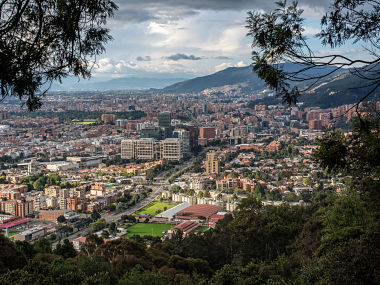Bogotá: So many men. Men at the bakery, men on bikes, men in parks, men in the grocery aisles. “It’s weird,” said Adriana Pérez, a nurse in scrubs waiting at the bank, the only woman in sight. “But it’s working.” Bogotá, Colombia’s capital and largest city, joined Panama this week in instituting a gender-based virus-prevention measure designed to limit the number of people in the streets. On odd-numbered days, men can leave the house to seek out essentials. On even-numbered days, it’s the women’s turn. The measure comes as cities across Latin America are struggling to keep people off the streets, despite quarantine orders that have been in places for weeks in most countries. The virus has been slower to hit the region, but it is starting to be felt with brutal force in some parts, particularly in Ecuador, where hundreds of people have died in recent weeks, overwhelming the business hub of Guayaquil. Colombia has about 3,000 of Latin America’s more than 60,000 cases, most of them concentrated in Bogotá. To stop the spread of the virus, some countries in the region have begun arresting quarantine-breakers. Others have instituted curfews. Colombia’s capital is trying gender separation. [caption id=“attachment_8266181” align=“alignleft” width=“380”] File image of Bogota. By Federico Rios © 2020 The New York Times[/caption] There are exceptions for people working in critical industries, like food service and health care, and some other exemptions for special cases. Dog-walkers of any gender can leave for 20 minutes. But beyond that, anyone caught breaking the rule is subject to a fine of $240, about the minimum monthly salary in Colombia. Bogotá’s mayor, Claudia López, the first woman and the first openly gay individual to lead the city, has said transgender people can follow the gender with which they identify. The authorities, the health order says, should respect “diverse gender manifestations.” The mayor has called the measure the easiest way to split the population in a way that police can verify. During the first two days of the measure, police sanctioned 104 women and 610 men for violating the order, according to López. Violators must pay half the fine within five days or face a potential day in court. Peru had enacted a similar measure, but President Martín Vizcarra cancelled it following criticism that it would lead to discrimination against transgender people. Earlier this month, Human Rights Watch criticized Panama’s gender-separation policy, saying that the police had used it to detain and fine a transgender woman who had left the house on a day assigned to women. The police detained her, said the rights group, “apparently because the ‘male’ gender marker on her ID card did not match her appearance.” The Colombia measure is reminiscent of Bogotá’s best known traffic policy, restricting which license plates can go out on which days, depending on the plate’s final number. Bogotá, a city of eight million, typically has some of the worst traffic in the world, and the policy is a defining feature of life in the city during normal times. The country has already been under quarantine for nearly a month, a measure that limits most movement and has been particularly difficult on people with informal jobs who typically support their families on the work they do that day or that week. On Wednesday, Yesica Benavides stood amid the men on a Bogotá sidewalk, trying to sell candy. She had no gloves and no face protection, having given her only mask to her three-year-old, Nicole. “We go out every day,” she said, Nicole by her side. The two have been sleeping in a motel, and they pay their rent nightly. “If we don’t go out,” Benavides said, “we don’t eat.” But the measure drew praise in several corners of the city. In the middle-class neighborhood of El Recuerdo, the police stopped women to ask why they were out. Men lined the doorways of supermarkets, trying to stand 6 feet apart. “The fewer people there are in the street,” said William Legizamón, an engineer leaving a grocery store, “the better.” Jorge Chacón, a chef leaving a small market, said he noticed a decrease in street traffic and encouraged even stricter enforcement. “We need to be more drastic with these measures,” he said, “because people are going out.” Julie Turkewitz c.2020 The New York Times Company
Bogotá, Colombia’s capital and largest city, joined Panama this week in instituting a gender-based virus-prevention measure designed to limit the number of people in the streets
Advertisement
End of Article


)

)
)
)
)
)
)
)
)



